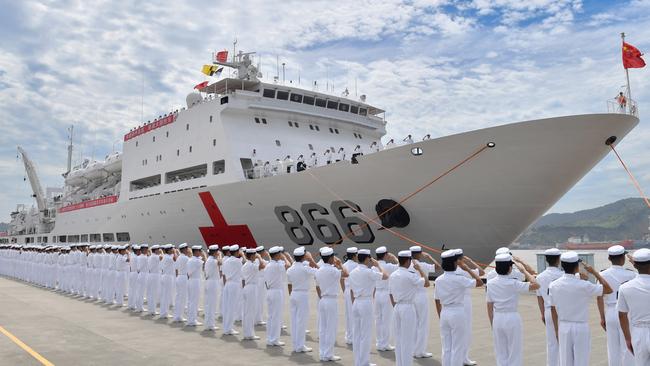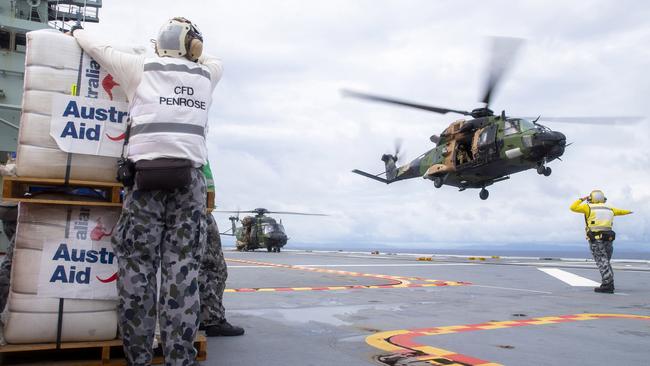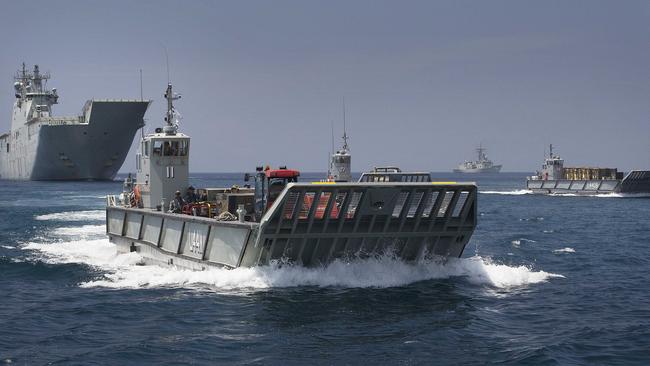China to use disasters as ‘back door’ to region
China has found a new way to exerting greater influence and coercion in the Indo Pacific region, Australia has been warned. See what it is.
National
Don't miss out on the headlines from National. Followed categories will be added to My News.
Exclusive: China will use natural disasters from extreme weather-related events in the Indo Pacific to “open a door” to exerting greater regional influence and coercion, Defence has been warned.
Climate change has been elevated to national security risk status, with an Office of National Intelligence (ONI) brief to Defence and Cabinet flagging it would have a direct impact on geopolitical stability.
There was greater frequency and severity of natural disasters that would create “additional demands” for more ADF humanitarian aid and disaster relief and civil instability call outs in the region.
But climate impacts were creating “new security challenges in that it may open doors for others who may try to take advantage of the altered environment to gain influence” in the Pacific.
It’s understood the reference is China, which Defence notes was creating uncertainty and instability in the South China Sea as well as close to other vulnerable sovereign nation “hot spots” linked to the Mekong River basin.

Defence has been working directly with the ONI to conduct the urgent “climate risk assessment”, which was completed late last year, to review its likely impact on national security as well as its own infrastructure, assets and capabilities.
It is understood the classified report was analysed by the authors of the Defence Strategic Review (DSR) that concluded significant challenges to defence estates and preparedness to a mass climate-related disaster in Australia and the broader Pacific.
It noted the speed at which there have been simultaneous global extreme weather impacts that required new consideration.
The DSR also identified a “significant risk” of mass migration, conflict and demand for peace keeping forces in the Indo Pacific, nominated the world’s most exposed climate hazard regions with droughts, cyclones, fires, floods and rising seas particularly threatening island nations.
“Climate change holds a number of significant implications for Defence,” it concluded.

In May Defence Secretary Greg Moriarty told a Senate Defence committee hearing the ADF was already increasingly doing more to respond to climate-related challenges in the region.
“Particularly in the Pacific, where there are vulnerable countries, we are doing more. The pattern of our engagement to help countries respond to natural disasters … is increasing. The ADF is thinking more.”
Australian Strategic Policy Institute’s head of climate and security policy Dr Robert Glasser said the frequency and severity of climate-related disasters now would only increase and cause a chain reaction of risks from food security to accidental military accidents in the race to help neighbours.

“With so many disruptions in countries, there will be opportunities for kind of opportunistic intervention by China, for example, and possibly other countries in the region as well,” he said.
Dr Glasser – a former Assistant Secretary General and Head of the UN’s Office of Disaster Risk Reduction – said the world had also never seen so many climate events, everywhere all at once.
“We used to have the luxury of saying it’s one big disaster at a time but what’s happening now is the simultaneous climate impacts … it’s a really complex range of issues but the underlining common line is the instability and disruption … and a far greater risk of conflict, of miscalculation, of escalation and opportunistic interventions,” he said.
Originally published as China to use disasters as ‘back door’ to region
Read related topics:Australia-China Relations




